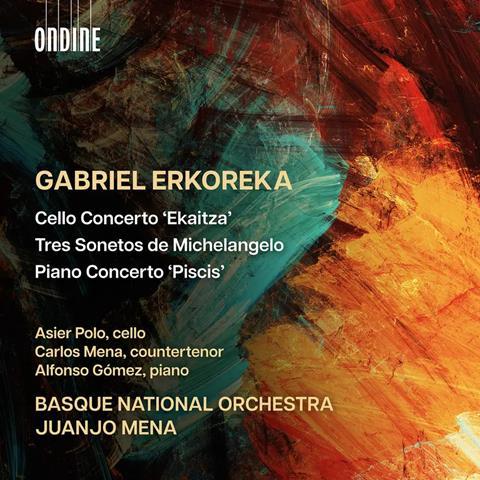Rigorous performances help to ground this sometimes-elusive music

The Strad Issue: August 2024
Description: Rigorous performances help to ground this sometimes-elusive music
Musicians: Asier Polo (cello) Carlos Mena (countertenor) Alfonso Gómez (piano) Basque National Orchestra/Juanjo Mena
Works: Erkoreka: Cello Concerto ‘Ekaitza’; Tres sonetos de Michelangelo; Piano Concerto ‘Piscis’
Catalogue number: ONDINE ODE1442-2
Bilbao-born composer Gabriel Erkoreka studied at London’s Royal Academy of Music with Michael Finnissy, returning to that institution himself to teach orchestration. Judging by the three restlessly inventive, kaleidoscopically hued movements of his Cello Concerto ‘Ekaitza’, he surely knew what he was talking about. At times the piece – scored for conventional cello with conventional, though large, orchestra – sounds like an electronic creation cunningly reconceived for acoustic instruments, with glittering percussion, novel instrumental blends and even microtones adding their own piquancy.
Its title means ‘tempest’ in Basque, and there’s a lot of turmoil within the music, which soloist Asier Polo (who gave the piece’s 2012 premiere) dispatches with Rostropovich-like muscularity and assertiveness. He’s very much a protagonist delivering a soliloquy, imbuing his reading with an intense sense of storytelling and breathtaking technical prowess. Most gratifyingly, Polo proves a perceptive guide through Erkoreka’s rhapsodic, free-form flow of ideas, as does Alfonso Gómez in the horoscope-inspired Piano Concerto ‘Piscis’, with strongly characterful support from the Basque National Orchestra and conductor Juanjo Meja throughout.
Read: Cello professor and string quartets take top honours at Reina Sofía School of Music
Read: Conservatorio della Svizzera Italiana
Read: John-Henry Crawford wins 2019 Carlos Prieto International Cello Competition
Tempting though it is simply to indulge the senses in Erkoreka’s rich, strange sound world as his ideas blossom, grow and wither, there’s also a nagging question as to what it all adds up to. It’s only in his Tres sonetos de Michelangelo (given a buoyant performance by countertenor Carlos Mena) that written texts provide a more defined framework for Erkoreka’s wildly imaginative but sometimes elusively diffuse ideas.
DAVID KETTLE











































No comments yet